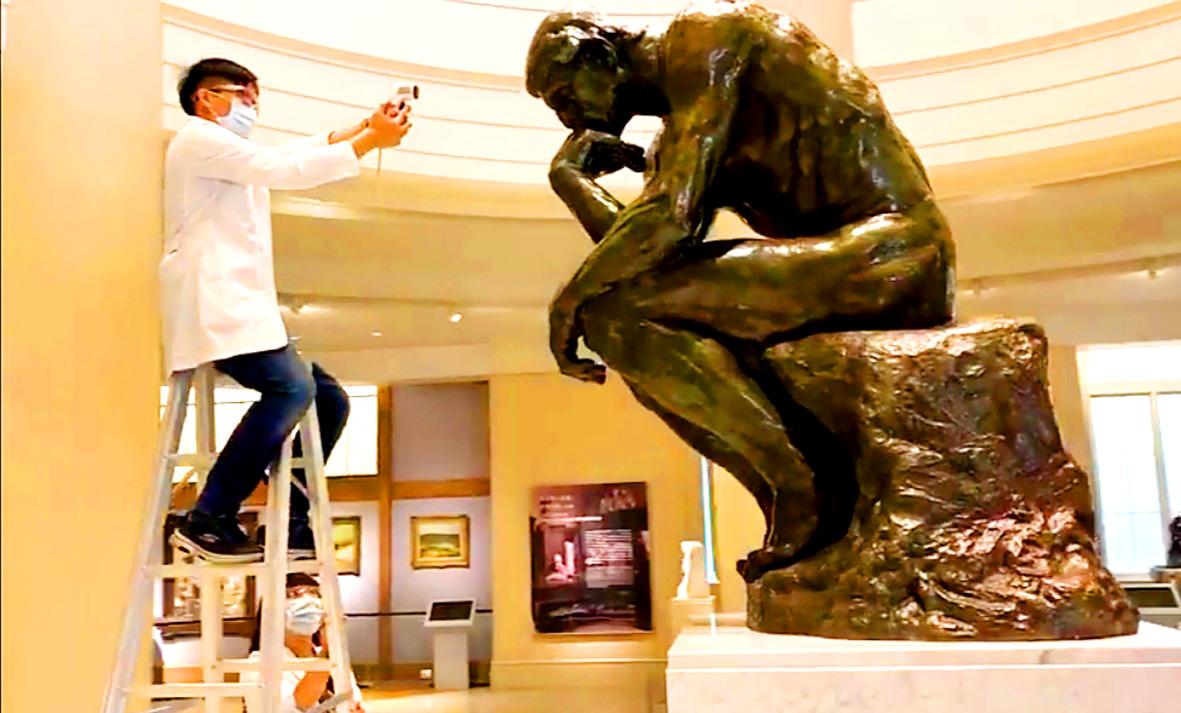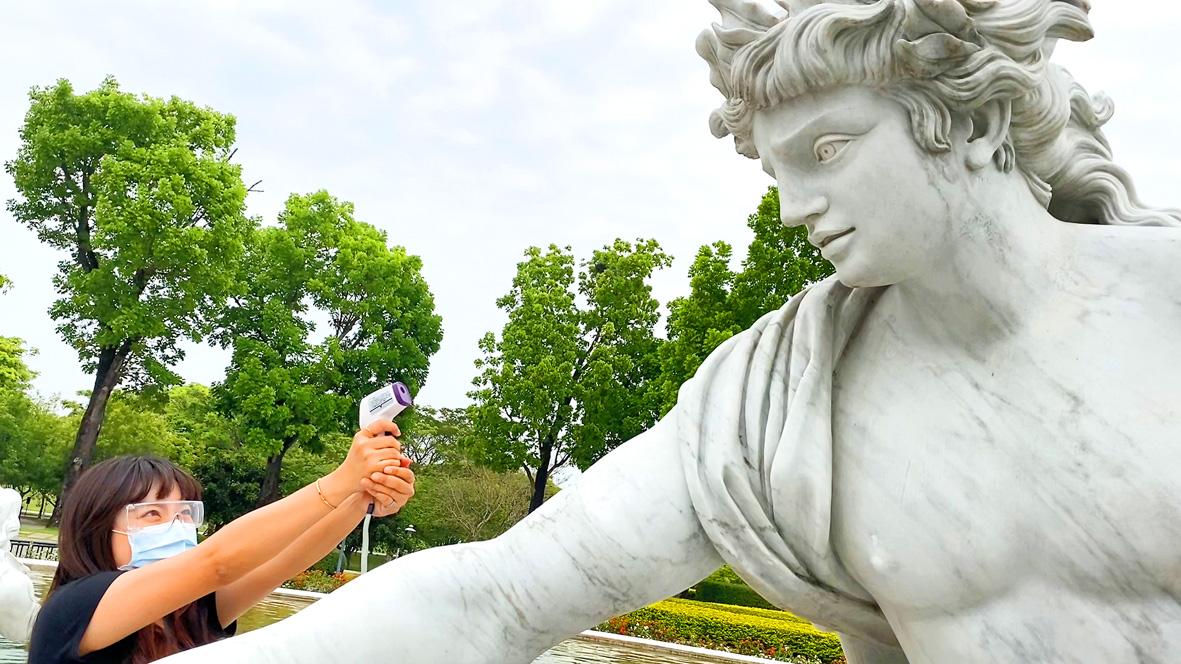Tainan’s Chimei Museum is promoting its exhibits in a video that advocates the importance of good disease prevention practices.
In a series of skits posted on Facebook on Tuesday, staff set out on a “mission” to take the temperatures of all the museum’s sculptures of people and animals.
In the opening scene, one staff member attempts to take the temperature of elephants in an African exhibit, but has difficulty reaching an elephant’s head with their forehead thermometer. After taking a reading of 35°C, the word “PASS” splashes across the screen.

Photo copied by Wu Chun-feng, Taipei Times
A replica of Auguste Rodin’s The Thinker makes an appearance, with staff reaching up to check his forehead temperature. Replicas of the Greek statue Venus de Milo and the Roman statue Apollo Belvedere are also featured.
The Thinker is shown to have a temperature of only 23.2°C, which a museum employee jokes is “because he wears too little clothing.”
Arriving at a North Pole exhibit, a staff member is greeted by a seal who asks: “Do you have to measure my temperature?” to which the staffer replies: “Don’t worry, it will be over quickly.”

Photo copied by Wu Chun-feng, Taipei Times
The seal is shown to have a temperature of minus-30°C, which the employee jokingly accepts as normal for an Arctic animal.
While the video is lighthearted, the message is that people must not let their guard down during the pandemic, the museum said, adding that it encourages everyone to check their temperature regularly.
In a separate video posted on Facebook on Monday, the Chimei Museum joined other museums to promote hand washing in a video themed after the popular Nintendo Switch game Animal Crossing.
The Chimei Museum said that it would continue making videos in the series to drive home the message that the public should not ease up on disease prevention efforts until the COVID-19 pandemic has passed.

‘DENIAL DEFENSE’: The US would increase its military presence with uncrewed ships, and submarines, while boosting defense in the Indo-Pacific, a Pete Hegseth memo said The US is reorienting its military strategy to focus primarily on deterring a potential Chinese invasion of Taiwan, a memo signed by US Secretary of Defense Pete Hegseth showed. The memo also called on Taiwan to increase its defense spending. The document, known as the “Interim National Defense Strategic Guidance,” was distributed this month and detailed the national defense plans of US President Donald Trump’s administration, an article in the Washington Post said on Saturday. It outlines how the US can prepare for a potential war with China and defend itself from threats in the “near abroad,” including Greenland and the Panama

The High Prosecutors’ Office yesterday withdrew an appeal against the acquittal of a former bank manager 22 years after his death, marking Taiwan’s first instance of prosecutors rendering posthumous justice to a wrongfully convicted defendant. Chu Ching-en (諸慶恩) — formerly a manager at the Taipei branch of BNP Paribas — was in 1999 accused by Weng Mao-chung (翁茂鍾), then-president of Chia Her Industrial Co, of forging a request for a fixed deposit of US$10 million by I-Hwa Industrial Co, a subsidiary of Chia Her, which was used as collateral. Chu was ruled not guilty in the first trial, but was found guilty

A wild live dugong was found in Taiwan for the first time in 88 years, after it was accidentally caught by a fisher’s net on Tuesday in Yilan County’s Fenniaolin (粉鳥林). This is the first sighting of the species in Taiwan since 1937, having already been considered “extinct” in the country and considered as “vulnerable” by the International Union for Conservation of Nature. A fisher surnamed Chen (陳) went to Fenniaolin to collect the fish in his netting, but instead caught a 3m long, 500kg dugong. The fisher released the animal back into the wild, not realizing it was an endangered species at

DEADLOCK: As the commission is unable to forum a quorum to review license renewal applications, the channel operators are not at fault and can air past their license date The National Communications Commission (NCC) yesterday said that the Public Television Service (PTS) and 36 other television and radio broadcasters could continue airing, despite the commission’s inability to meet a quorum to review their license renewal applications. The licenses of PTS and the other channels are set to expire between this month and June. The National Communications Commission Organization Act (國家通訊傳播委員會組織法) stipulates that the commission must meet the mandated quorum of four to hold a valid meeting. The seven-member commission currently has only three commissioners. “We have informed the channel operators of the progress we have made in reviewing their license renewal applications, and